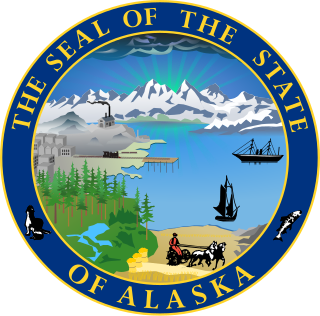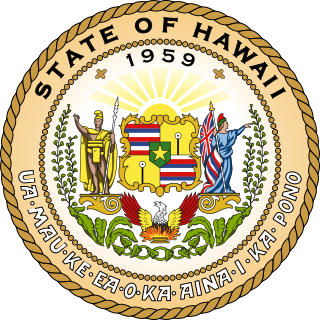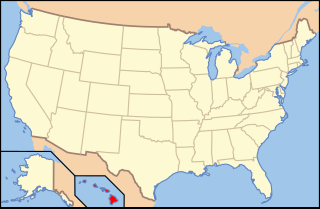Baker v. Vermont, 744 A.2d 864, was a lawsuit decided by Vermont Supreme Court on December 20, 1999. It was one of the first judicial affirmations of the right of same-sex couples to treatment equivalent to that afforded different-sex couples. The decision held that the state's prohibition on same-sex marriage denied rights granted by the Vermont Constitution. The court ordered the Vermont legislature to either allow same-sex marriages or implement an alternative legal mechanism according similar rights to same-sex couples.

Goodridge v. Dept. of Public Health, 798 N.E.2d 941, is a landmark Massachusetts Supreme Judicial Court case in which the Court held that the Massachusetts Constitution requires the state to legally recognize same-sex marriage. The November 18, 2003, decision was the first by a U.S. state's highest court to find that same-sex couples had the right to marry. Despite numerous attempts to delay the ruling, and to reverse it, the first marriage licenses were issued to same-sex couples on May 17, 2004, and the ruling has been in full effect since that date.

Prior to the Supreme Court's decision in Obergefell v. Hodges (2015), U.S. state constitutional amendments banning same-sex unions of several different types passed, banning legal recognition of same-sex unions in U.S. state constitutions, referred to by proponents as "defense of marriage amendments" or "marriage protection amendments." These state amendments are different from the proposed Federal Marriage Amendment, which would ban same-sex marriage in every U.S. state, and Section 2 of the Defense of Marriage Act, more commonly known as DOMA, which allowed the states not to recognize same-sex marriages from other states. The amendments define marriage as a union between one man and one woman and prevent civil unions or same-sex marriages from being legalized, though some of the amendments bar only the latter. The Obergefell decision in June 2015 invalidated these state constitutional amendments insofar as they prevented same-sex couples from marrying, even though the actual text of these amendments remain written into the state constitutions.
This article contains a timeline of significant events regarding same-sex marriage and legal recognition of same-sex couples worldwide. It begins with the history of same-sex unions during ancient times, which consisted of unions ranging from informal and temporary relationships to highly ritualized unions, and continues to modern-day state-recognized same-sex marriage. Events concerning same-sex marriages becoming legal in a country or in a country's state are listed in bold.
Same-sex marriage has been legally recognized in Connecticut since November 12, 2008, following a state court decision that found the state's civil unions failed to provide same-sex couples with rights and privileges equivalent to those of marriage. Connecticut was the second U.S. state to legalize same-sex marriage, after neighboring Massachusetts.

Ballot Measure 2 of 1998 is a ballot measure, since ruled unconstitutional, that added an amendment to the Alaska Constitution that prohibited the recognition of same-sex marriage in Alaska. The Ballot measure was sparked by the lawsuit filed by Jay Brause and Gene Dugan, after the two men were denied a marriage license by the Alaska Bureau of Vital Statistics. In Brause v. Bureau of Vital Statistics, 1998 WL 88743, the Alaska Superior Court ruled that the state needed compelling reason to deny marriage licenses to same-sex couples and ordered a trial on the question. In response, the Alaska Legislature immediately proposed and passed Resolution 42, which became what is now known as Ballot Measure 2. Ballot Measure 2 passed via public referendum on November 3, 1998, with 68% of voters supporting and 32% opposing. The Bause case was dismissed following the passage of the ballot measure.

Constitutional Amendment 2 of 1998 amended the Constitution of Hawaii, granting the state legislature the power to prevent same-sex marriage from being conducted or recognized in Hawaii. Amendment 2 was the first constitutional amendment adopted in the United States that specifically targeted same-sex partnerships.
Same-sex marriage has been legal in Florida since January 6, 2015, as a result of a ruling in Brenner v. Scott from the U.S. District Court for the Northern District of Florida. The court ruled the state's same-sex marriage ban unconstitutional on August 21, 2014. The order was stayed temporarily. State attempts at extending the stay failed, with the U.S. Supreme Court denying further extension on December 19, 2014. In addition, a state court ruling in Pareto v. Ruvin allowed same-sex couples to obtain marriage licenses in Miami-Dade County on the afternoon of January 5, 2015. In another state case challenging the state's denial of marriage rights to same-sex couples, a Monroe County court in Huntsman v. Heavilin stayed enforcement of its decision pending appeal and the stay expired on January 6, 2015.

Varnum v. Brien, 763 N.W.2d 862, was an Iowa Supreme Court case in which the Court unanimously held that the state's limitation of marriage to opposite-sex couples violated the equal protection clause of the Iowa Constitution. The case had the effect of legally recognizing same-sex marriage in Iowa. In 2007, a lower court had granted summary judgment in favor of six same-sex couples who sued Timothy Brien, Polk County Recorder, for refusing to grant them marriage licenses.
Kerrigan v. Commissioner of Public Health, 289 Conn. 135, 957 A.2d 407, is a 2008 decision by the Connecticut Supreme Court holding that allowing same-sex couples to form same-sex unions but not marriages violates the Connecticut Constitution. It was the third time that a ruling by the highest court of a U.S. state legalized same-sex marriage, following Massachusetts in Goodridge v. Department of Public Health (2003) and California in In re Marriage Cases (2008). The decision legalized same-sex marriage in Connecticut when it came into effect on November 12, 2008. There were no attempts made to amend the state constitution to overrule the decision, and gender-neutral marriage statutes were passed into law in 2009.

House Bill 444 was a 2009 bill of the Hawaii State Legislature, passed in April 2010 and vetoed by Governor of Hawaii Linda Lingle, that would have legalized civil unions for couples in the state of Hawaii. Its legislative process was accompanied by controversy over the bill's content and effects and rallies were held by supporters and opponents.
Same-sex marriage has been legally recognized in Indiana since October 6, 2014. The state had previously restricted marriage to different-sex couples by statute in 1986. By legislation passed in 1997, it denied recognition to same-sex relationships established in other jurisdictions. A lawsuit challenging the state's refusal to grant marriage licenses to same-sex couples, Baskin v. Bogan, won a favorable ruling from the U.S. District Court for the Southern District of Indiana on June 25, 2014. Until the Seventh Circuit Court of Appeals granted an emergency stay of the district court's ruling on June 27, most Indiana counties issued marriage licenses to same-sex couples. The Seventh Circuit affirmed the district court's ruling in Baskin on September 4. A ruling in Bowling v. Pence stated that the state must recognize same-sex marriages performed out-of-state and the decision was stayed until the Seventh Circuit ruled on the merits in similar cases. It also stated that the ruling would remain stayed if the circuit court stayed its decision in the related cases.

Baehr v. Miike was a lawsuit in which three same-sex couples argued that Hawaii's prohibition of same-sex marriage violated the state constitution. Initiated in 1990, as the case moved through the state courts, the passage of an amendment to the state constitution in 1998 led to the dismissal of the case in 1999. The Full Faith and Credit Clause of the Constitution would have provided that all states would be potentially required to recognize marriages obtained in Hawaii, prompting the passage of the federal Defense of Marriage Act (DOMA) in 1996 under Bill Clinton. Dozens of statutes and constitutional amendments banning same-sex unions at the state level also followed Baehr.

Lesbian, gay, bisexual, and transgender (LGBT) people in the U.S. state of Hawaii enjoy the same rights as non-LGBT people. Same-sex sexual activity has been legal since 1973; Hawaii being one of the first six states to legalize it. In 1993, a ruling by the Hawaiʻi Supreme Court made Hawaii the first state to consider legalizing same-sex marriage. Following the approval of the Hawaii Marriage Equality Act in November 2013, same-sex couples have been allowed to marry on the islands. Additionally, Hawaii law prohibits discrimination on the basis of both sexual orientation and gender identity, and the use of conversion therapy on minors has been banned since July 2018. Gay and lesbian couples enjoy the same rights, benefits and treatment as opposite-sex couples, including the right to marry and adopt.

In Hawaii, the LGBT laws have been evolving for the past hundred years. In the pre-19th century, the influence of Polynesian culture led to a more open-minded state. After the first Christian missionaries began arriving in Hawaii, strict sodomy laws were enacted. Territory v. Bell (1958) was the last sodomy case argued in Hawaii. After the turn of the 20th century, LGBT issues began being taken to and decided by the Supreme Court. In 2013, Hawaii voted in favor of gay marriage, and marriage licenses began to be issued to LGBT couples.

Sevcik v. Sandoval is the lead case that successfully challenged Nevada's denial of same-sex marriage as mandated by that state's constitution and statutory law. The plaintiffs' complaint was initially filed in the U.S. District Court for the District of Nevada on April 10, 2012, on behalf of several couples denied marriage licenses. These couples challenged the denial on the basis of the U.S. Constitution's Fourteenth Amendment guarantee of equal protection.
This article contains a timeline of significant events regarding same-sex marriage in the United States. On June 26, 2015, the landmark US Supreme Court decision in Obergefell v. Hodges effectively ended restrictions on same-sex marriage in the United States.

The Hawaii Marriage Equality Act of 2013 is legislation passed by the Hawaii State Legislature as Senate Bill 1 (SB1) and signed by Governor Neil Abercrombie which legalized same-sex marriage in the U.S. state of Hawaii. Prior to the bill's enactment, same-sex couples in the state of Hawaii were allowed to form civil unions or reciprocal beneficiary relationships ; however, civil unions are both legally limited to civil officials in their performance and unrecognized by the federal government, and RBRs are even more limited by the rights and privileges accorded.
Same-sex marriage has been legal in Kentucky since the U.S. Supreme Court's ruling in Obergefell v. Hodges on June 26, 2015. The decision, which struck down Kentucky's statutory and constitutional bans on same-sex marriages, was handed down on June 26, 2015, and Governor Steve Beshear and Attorney General Jack Conway announced almost immediately that the court's order would be implemented.
Daniel R. Foley is an American retired attorney and judge, who served on the Hawaii Intermediate Court of Appeals from 2000 to 2016. A civil rights attorney known for his support of legalizing same-sex marriage, Foley was appointed by Governor Ben Cayetano in July 2000 and confirmed in August of that year. Known primarily for representing three couples in Baehr v. Miike, the first American case in which gay couples sued a state for the right to marry, Foley was appointed to the Supreme Court of Palau as an Associate Justice in 2011.








